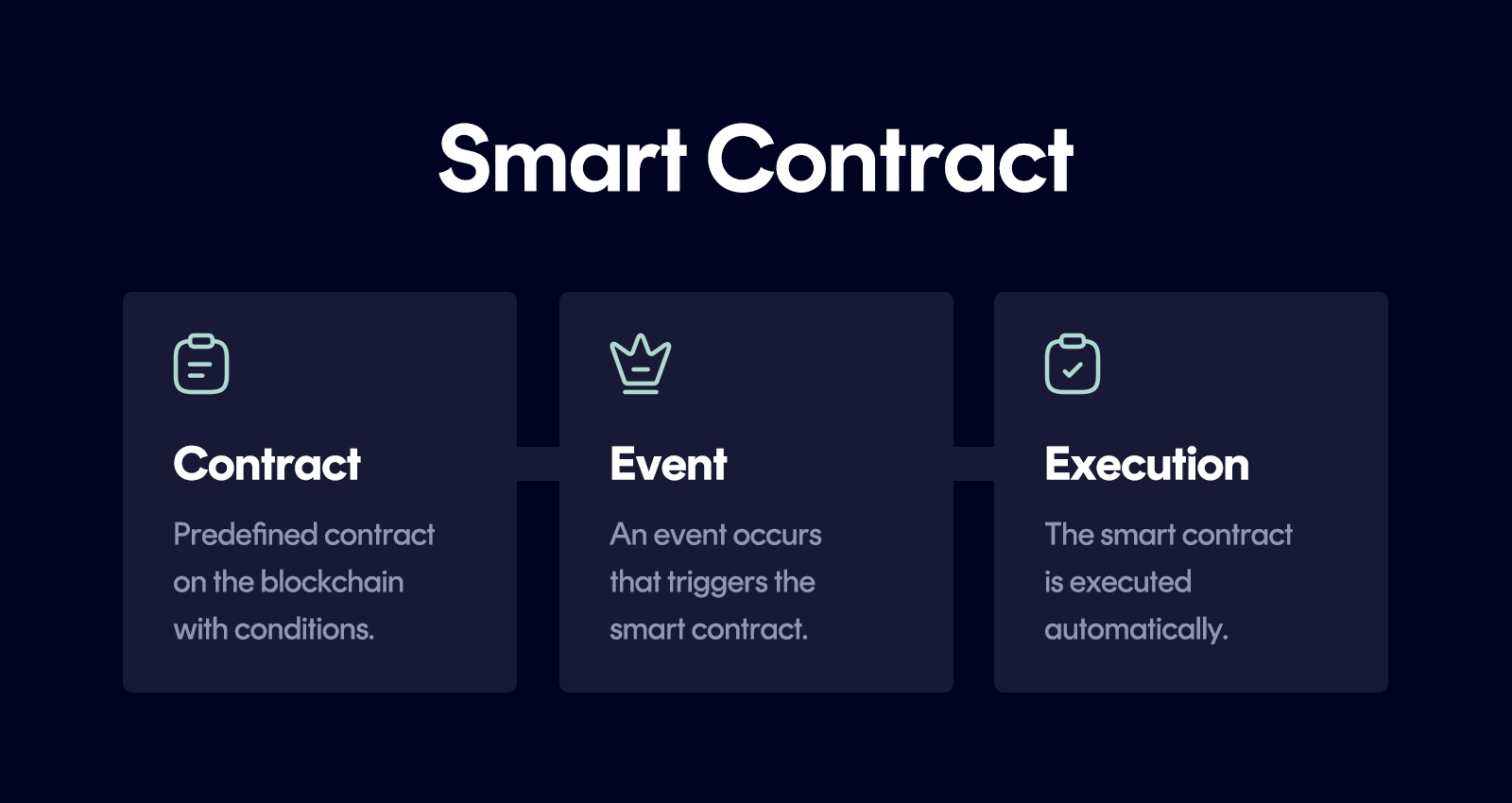How do Smart Contracts work?
Smart contracts are self-executing agreements developed using blockchain technology and programming code. This code defines the terms and rules of the contract and enables automatic actions when certain conditions are met. They’re deployed and executed on blockchain platforms such as Ethereum.
Table of contents

Creating a smart contract begins with writing the contract’s code in a specific programming language, such as Solidity for Ethereum. This code typically contains if-then statements that trigger certain actions once predefined conditions are met.
Ethereum Virtual Machine (EVM)
A key element in how smart contracts work on the Ethereum platform is the Ethereum Virtual Machine (EVM). The EVM is an abstract, decentralized, and immutable computing environment that runs on every node in the Ethereum network. It allows smart contracts to be executed by translating the contract code into bytecode and running it in an isolated environment. This ensures the security and integrity of the entire network.
Running smart contracts on the EVM isn’t free—it incurs so-called gas fees, which are paid in Ether, the currency of the Ethereum network.
After a smart contract has been developed and tested, it’s deployed on the respective blockchain platform. This process involves sending the contract code to the network, where it’s stored on one or more nodes. Each of these nodes is part of the distributed network that underpins the blockchain.

Once the conditions of the smart contract are met, it’s automatically executed by the EVM.
The execution of a smart contract can include actions such as:
Transferring cryptocurrencies or digital assets
Triggering events in other smart contracts
Updating information on the blockchain
The resulting transactions are validated by the nodes in the network and added to the blockchain as new blocks.
Thanks to their decentralized and immutable nature, smart contracts are transparent, tamper-proof, and self-executing. They enable trusted transactions and agreements between different parties without relying on intermediaries like banks or notaries.

The 10 Largest Smart Contract Platforms
| Smart Contract Platform | Market Cap | Consensus Mechanism | Founder |
|---|---|---|---|
Ethereum | $248.9B | Proof of Stake | Vitalik Buterin, Gavin Wood |
BNB | $85.89B | Proof of Staked Authority | Changpeng Zhao |
Solana | $49.88B | Proof of History, Proof of Stake | Anatoly Yakovenko, Raj Gokal |
Cardano | $10.85B | Proof of Stake (Ouroboros) | Charles Hoskinson |
Avalanche | $4.12B | Proof of Stake | Emin Gün Sirer |
Polkadot | $2.35B | Nominated Proof of Stake | Gavin Wood, Robert Habermeier, Peter Czaban |
NEAR Protocol | $1.38B | Proof of Stake (Doomslug) | Erik Trautman, Alex Skidanov, Illia Polosukhin |
Cosmos | $1.07B | Delegated Proof of Stake (Tendermint) | Jae Kwon, Ethan Buchman |
Algorand | $878.67M | Pure Proof of Stake | Silvio Micali |
Benefits of Smart Contracts
Automation: Smart contracts automatically execute actions as soon as predefined conditions are met. This saves time and reduces human error.
Transparency: Since contract terms are stored on the blockchain, all participants can view and verify the details.
Cost-efficiency: By eliminating intermediaries like banks or notaries, smart contracts can help reduce transaction costs.
Security: Blockchain technology offers a high level of security and immutability. Manipulation or later changes to the contract are virtually impossible.
Trust: Smart contracts enable trusted transactions between different parties without relying on third parties.
Drawbacks of Smart Contracts
Technical complexity: Developing smart contracts requires specialized programming skills, which creates a significant barrier to entry for many people.
Susceptibility to errors: Bugs or security vulnerabilities in the code can have serious consequences, as they may be exploited and lead to financial losses.
Lack of flexibility: Smart contracts are very rigid in their execution. If circumstances change or unforeseen situations arise, it can be difficult to modify the contract without creating a completely new one.
Regulatory and legal uncertainty: Because smart contracts and blockchain technology are still relatively new, there’s significant uncertainty in many countries regarding their regulation and legal recognition.
Scalability and performance: The performance and scalability of smart contracts can be limited by the underlying blockchain platform, potentially leading to bottlenecks and delays in execution.
Examples and Use Cases of Smart Contracts
Example 1: Finance
Smart contracts can be used for a wide range of financial services, such as automated payments, asset tokenization, derivatives, or decentralized finance applications (DeFi).
Example 2: Supply Chain Management
Smart contracts offer the ability to automate and document transactions, production processes, and deliveries within supply chains.
Example 3: Real Estate Market
Smart contracts can simplify the buying, selling, or renting of real estate by automatically executing payments, transfers of ownership rights, and other relevant contractual clauses.
Example 4: Intellectual Property and Copyright
Smart contracts can be used for the automatic licensing and distribution of royalties to copyright holders.
Example 5: E-Government
Potential applications for smart contracts in the public sector include issuing licenses, permits, or managing social benefits.
Legal Status of Smart Contracts
Definition and Execution of Smart Contracts
Smart contracts are not traditional agreements signed (digitally or otherwise) but rather computer-driven programs built on blockchain technology. They store the contract terms in code—embodying the principle that “code is law”—which enables fully automated execution. Once created, smart contracts are stored as a data block on the blockchain and are executed as soon as the contract conditions are met.
Legal Recognition of Smart Contracts
Questions remain around the legal recognition of smart contracts. Lawyers evaluate this issue based on traditional contract principles—offer, acceptance, and consideration. As long as these elements are present, smart contracts can be regarded as legally binding agreements.
Some states, such as Arizona and Nevada in the United States, have passed laws recognizing smart contracts, although this doesn’t automatically turn them into enforceable contracts in every situation.

Legal Enforcement of Smart Contracts
The enforceability of smart contracts depends on certain rules:
Offer, acceptance, and consideration: All of these components must be present for a contract to be legally enforceable.
Legally permissible terms: A contract cannot include terms that are prohibited or unenforceable under the law.
Electronic signatures: Smart contracts must be legally recognized for electronic signatures. Certain types of agreements cannot be signed electronically.
Challenges and Legal Issues
There are several challenges and potential issues associated with using smart contracts:
Automatic enforcement: If the terms of a smart contract turn out to be legally unenforceable, it can create problems since the contract executes automatically.
Contract modifications: Once a smart contract is activated, it cannot be altered. Any changes require the creation of an entirely new contract.
Dispute resolution: Due to the immutability of smart contracts, resolving disputes can be complicated.
Privacy and anonymity: Because smart contracts run on blockchain technology, questions about privacy and the anonymity of participants may arise.
Consumer protection: How can consumer rights be safeguarded in the context of smart contracts, especially given their automated and immutable nature?
Jurisdiction: Since blockchain networks are inherently decentralized, questions may arise about which court has jurisdiction in the event of legal disputes.
Despite these current challenges, smart contracts are expected to see increasing use and could ultimately transform the way we enter into agreements. When and how lawmakers in countries like Germany will address this and establish a legal framework remains to be seen.
Please note that the legal aspects of smart contracts are a rapidly evolving field, and staying up-to-date is crucial. It’s always advisable to seek legal advice from a qualified attorney.
Challenges and Future Developments
Interoperability
Interoperability between different blockchain platforms and smart contract protocols is a significant challenge that needs to be addressed to drive widespread adoption and use of smart contracts.
Scalability
Scalability in blockchain technology is crucial to meet growing demands for transaction speed and volume. Advances in areas like Layer-2 solutions or sharding could help overcome these challenges.
Privacy and Anonymity
Improvements in privacy and anonymity for smart contracts are necessary to address users’ concerns about data protection. Approaches like zero-knowledge proofs or confidential smart contracts could offer potential solutions.
Legal Frameworks and Standardization
Establishing clear legal frameworks and industry-wide standards could help increase legal certainty and trust in smart contracts.
Conclusion
Smart contracts have the potential to fundamentally transform contract execution and business processes across various industries. Despite existing challenges and uncertainties, they offer significant advantages in terms of efficiency, transparency, and security. Through technological advancements, legal clarity, and broader adoption, smart contracts could play a central role in the digital economy of the future.
About the author
Hi, I'm Philipp. 👋
Founder coinbird.com
With over 15 years of experience in the IT sector, I love building easy-to-use digital products that actually help people. In 2017, I fell down the Bitcoin rabbit hole and gradually realized that the crypto world lacked simple, user-friendly tools for everyday people. That’s why I created coinbird.com – to make crypto easier to understand, more accessible, and transparent.
LinkedIn






